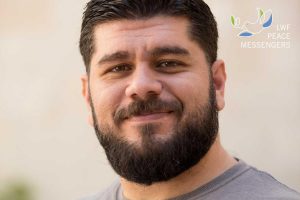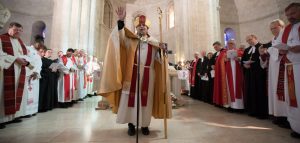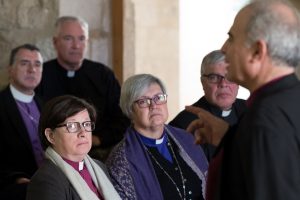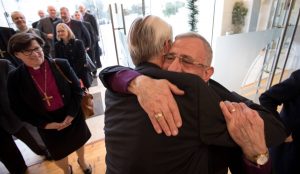Churches for Middle East Peace (CMEP)’s executive director, Rev. Dr. Mae Elise Cannon, attended the Palestine National Council convention this week, including Palestinian Authority (PA) President Mahmoud Abbas’ speech. CMEP welcomes the commitment of the PLO to peace negotiations, but condemns the inflammatory and anti-Semitic rhetoric used during the speech. To learn more about CMEP’s reaction to the speech and Abbas’ subsequent apology, click here or read below. As a member of CMEP, the ELCA affirms the CMEP statement.
For Immediate Release: Churches for Middle East Peace Welcomes PLO Re-Commitment to Peace Negotiations, Condemns Anti-Semitic Remarks.
Washington, D.C. – May 3, 2018 – Palestinian Authority (PA) President Mahmoud Abbas presented his future policy to the first regular session of the Palestine National Council (PNC) since 1996, calling for new negotiations leading to a two-state solution. His re-commitment to the peace process comes after remarks made earlier in January in which he threatened to withdraw from the Oslo Accords and suspend PLO recognition of Israel. However, the conciliatory tone brought to the conversation regarding the two-state solution was severely undermined by anti-Semitic rhetoric peppered throughout the speech.
Churches for Middle East Peace (CMEP) welcomes President Abbas’s renewed commitment to the establishment of a Palestinian state existing alongside Israel and his calls for non-violent popular resistance to Israel’s occupation. CMEP condemns the anti-Semitic and inflammatory remarks and affirms that support for a Palestinian state does not require downplaying historical Jewish suffering or denying their connection to the land.
The PNC is the Palestinian Liberation Organization (PLO)’s parliament representing a wide range of Palestinian political groups, including President Abbas’s own Fatah Party. The PNC endorsed Abbas’s vision of a two-state solution and his calls for non-violent resistance. They elected a new PLO Executive Committee with Abbas serving as its chairman.
Abbas’s remarks before the PNC also included highly inflammatory, anti-Semitic rhetoric, which included claims that modern Israelis have no ties to the land, that European Jews are descendants of the Khazar converts to Judaism and not Middle Eastern Jews, and that the Holocaust can be blamed on Jews’ social behavior.
On May 4th in Ramallah, Abbas issued an apology and clarifying his remarks, “I would also like to reiterate our long-held condemnation of the Holocaust, as the most heinous crime in history, and express our sympathy with its victims… Likewise, we condemn anti-Semitism in all its forms, and confirm our commitment to the two-state solution, and to live side by side in peace and security.”
CMEP Executive Director Dr. Mae Elise Cannon attended the PNC session, along with representatives from Canada, the European Union, Ireland, Sweden, the United Kingdom, the United Nations, and a deputy speaker of Israel’s Knesset.
Cannon said this about the PNC Meetings: “It was appalling to hear some of the comments from Abbas about history and the Jewish people. While I am encouraged by his recent apology and statement, the anti-Semitic tone and emphasis of his speech were unacceptable. At the same time, Abbas’ speech did reconfirm a stalwart commitment to peace and the two-state solution; which should be lauded. The Palestinian Authority has reiterated time and time again that they are willing to be a partner for peace of the core commitments of 1967 borders, a shared Jerusalem, and other final status issues are addressed.”




